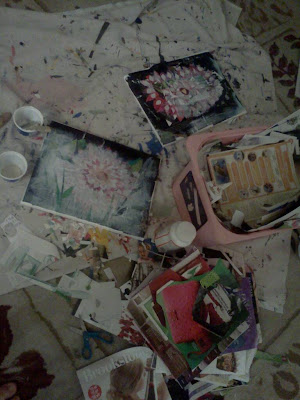Below are the 8 habits of mind I use in my art studio. As an art teacher and a teacher of 15 years I deeply believe that the arts help prepare our children for 21st Century learning, thinking and work-related skills. It's one thing to teach a child concepts, vocabulary, and historical facts, but it's quite another form of learning to teach a child to think, work with their mistakes, persist, envision, express, observe, reflect, explore and understand. In teaching with the habits of mind as the 'umbrella' that guides all lessons and units we ensure that children will always embrace all situations with these helpful habits of thinking. In the art room, I don't teach the kids to be 'artists', I teach them to be independent thinkers and explorers of answers by following their own questions.
I have often been asked why I don't have kids make Picasso-like work, or Matisse-like work. While we still look at these artists and their work, we rarely waste time trying to merely emulate them or their style. In emulating another artist's work we dispossess the children of their own innovative abilities to find their own unique style. Instead, we discover what inspired these artists to do what they did and similarly look for our own inspirations in our own lives. In following our own inspirations we place value in our own ideas, our own stories, our own unique capabilities. When all else in school is simply telling kids what they should know, in the art studio kids learn to value their own voice and to verbalize, through art, their own expression of this world. The idea that you can only be exceptional at what you love is huge in the art studio. To simply create a Picasso-like face, we might make a pretty picture to take home, but kids will never walk away truly feeling like creators or innovators of their own ideas or concepts.
The arts, in fact, give children an enormous advantage in the future, when they hit the job market. Children who can follow these habits of mind (see below) can take everyday obstacles, in any field, and turn them into opportunities. When I hear people downplay the importance of my role as an art teacher in education, I immediately know they've never had a hands-on studio art experience. When I hear about art and music being cut from budgets to only be replaced with more seemingly academically-focused courses, I am saddened for those children, for they will only be further crippled by this lack of arts education in their lives. I am not creating artists, I am teaching an essential 'language' of seeing, creating and expressing that will undoubtedly enhance all forms of human interactions. Art is a life-changing experience.....and no education should be without it....
![]()
Studio Thinking Framework | |
| Develop Craft |
| Engage & Persist |
| Envision |
| Express |
| Observe |
| Reflect |
| Stretch & Explore |
| Understand Art World |













